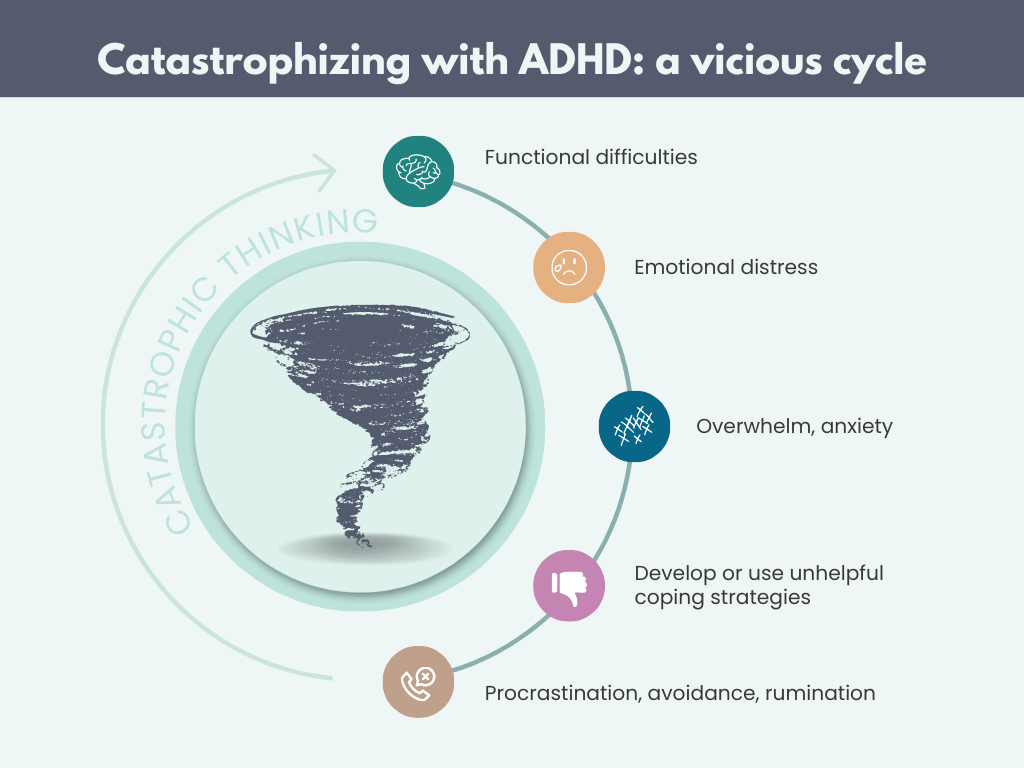One day in college, I got an email from my professor asking to set up an in-person meeting. Immediately, I thought, "I must have done something wrong." I had straight A's and never got in trouble, yet that was my first thought. I was convinced I was failing her class, being kicked out of my program, or both.
In the end, it was neither—just an annual advisory meeting.
But... why did my brain jump to a highly illogical conclusion and never consider anything else?
That instinctual, knee-jerk reaction is common amongst ADHDers, and it's known as catastrophizing.
Too long; didn’t read
- Catastrophic thinking is a cognitive distortion where you assume the worst-case scenario.
- People with ADHD may engage in catastrophic thinking due to deficits in executive functioning, emotional dysregulation, and negative core beliefs.
- Catastrophic thinking can be managed with certain cognitive behavioral therapy techniques, which are discussed near the bottom of the page.
What is 'catastrophic thinking'?

Catastrophizing, or catastrophic thinking, is a type of cognitive distortion that engages in magnification or 'blowing things out of proportion.' In other words, irrational thinking patterns exaggerate a situation's significance, and the worst possible outcome is assumed.
Examples of catastrophizing:
Situation: Mirabel texts her partner, Pablo, and doesn't receive a reply within an hour.
Catastrophic thinking: Pablo wants to break up with Mirabel.
Situation: Sydney makes an honest mistake at work.
Catastrophic thinking: Sydney is going to get fired.
Situation: Josh is studying for a big exam and feels a bit anxious.
Catastrophic thinking: Josh is going to fail the exam and never graduate.
Situation: Will's partner, Oliver, was supposed to be home at 11:00 p.m. It's now 11:04 p.m.
Catastrophic thinking: Oliver was kidnapped.
Situation: Paul has a sore throat.
Catastrophic thinking: Paul has a deadly disease.
ADHD and catastrophizing - what’s the link?
Everyone engages in cognitive distortions from time to time. Still, because adults with ADHD are susceptible to unhelpful cognitive coping strategies, they're more likely to engage in things like rumination, catastrophizing, self-blame, and blaming others.1,2
Additionally, while ADHD is mainly known for symptoms like hyperactivity and inattention, executive functioning deficits are also characteristic of ADHD.3
Impulsivity due to executive dysfunction
Executive functions are a set of cognitive skills responsible for goal-directed behavior. In other words, they help us get things done.
There are three main areas of executive functioning: working memory, cognitive flexibility, and inhibitory control—the ability to regulate attention, behavior, thoughts, and emotions. When someone lacks inhibitory control, it’s referred to as impulsive behavior.
Difficulties with impulsivity may explain why catastrophic thinking happens with so many ADHDers.
Rumination tendencies
Rumination is a cycle of overthinking, negative self-talk, and obsessively replaying the same thoughts, fears, or feelings over and over again.
It's incredibly uncomfortable, anxiety-inducing, and—perhaps unsurprisingly—linked to catastrophizing.4
If you're continuously worried about what might go wrong, your mind is more likely to jump to the worst-case scenario.
Emotional dysregulation
Since ADHD commonly causes deficits in executive functioning and impulsivity, neurodiverse individuals are more prone to emotional dysregulation.2
In other words, it's harder to control our emotions.
When we experience high stress or negative emotions, we can quickly become overwhelmed, which can lead to what's known as an ADHD meltdown.
ADHD meltdowns
Meltdowns, or extreme emotional reactions, look different for everyone but often include:
- Angry outbursts
- Uncontrollable crying
- Extreme self-blame or being overly self-critical
- Extremely low self-esteem
- Catastrophizing
The functional difficulties of living in a neurotypical society
Cognitive distortions might occur more often in ADHD brains due to nurture rather than nature. Living with ADHD comes with many challenges, and as ADHDers encounter more and more challenges, they may develop negative core beliefs.1
So, it becomes an exhausting cycle.
- Having problems at work or school leads to emotional distress.
- Emotional distress leads to feelings of overwhelm.
- Feeling overwhelmed can cause poor coping strategies (procrastinating, task avoidance, etc.)
- Poor coping methods lead to more functional difficulties.
Because of this cycle, catastrophic thinking might even be a learned defense mechanism in certain situations.

Other reasons someone might catastrophize:
- Trauma and PTSD
- Anxiety
- Depression
- Obsessive-compulsive disorder (OCD)
- Phobias
- Eating disorders
- Chronic pain5
- Poor sleep quality6
- Low self-esteem1
How to recognize (and change) irrational thoughts and worries
Therapy and medication
ADHD medications fall into two categories: stimulants (e.g., Adderall, Vyvanse) and nonstimulants (e.g., Strattera). They don't cure ADHD but can help manage symptoms, including emotional dysregulation.2
CBT (cognitive behavioral therapy) is another standard method. Since it focuses on adjusting beliefs and thought patterns, it can be incredibly worthwhile for anyone prone to catastrophic thinking.
Self-care
Rumination, catastrophic thinking, and irrational thoughts are all linked to anxiety. And as cliché as it sounds, it can be reduced by practicing good self-care habits:
- Eating healthy foods
- Exercising
- Getting enough sleep
- Drinking enough water
- Spending time outside
- Practicing mindfulness
Challenge your thoughts with cognitive restructuring
One component of CBT is cognitive restructuring, a technique aimed at identifying and changing unhealthy or irrational thoughts.1 Even if you're not currently in therapy, you can still use the same basic principles to help you overcome catastrophic thinking.
👉 You try it! After you identify your catastrophic thoughts, ask yourself these questions:
- Has a situation like this ever happened before?
- In that previous situation, what happened? Was it a catastrophe?
- Why do I think the worst-case scenario will happen now? Is there any evidence?
- What is a more likely outcome?
Overall, the most important thing to ask yourself: Is it true?
Write it down!
Some people find it especially helpful to write down their fears—seeing them in writing can highlight the illogicality of those fears.
Then, you can work on replacing irrational thoughts with more realistic ones, and maybe not have a full-blown panic attack when your professor emails you about setting up a meeting.
-
Sources
1 Cognitive Therapy and Research | The Relationship Between Cognitive Distortions and Adult Attention-Deficit/Hyperactivity Disorder After Accounting for Comorbidities and Personality Traits
2 Borderline Personality Disorder and Emotion Dysregulation | Emotion dysregulation in adults suffering from attention deficit hyperactivity disorder (ADHD), a comparison with borderline personality disorder (BPD)
3 PLOS ONE | Evidence of emotion dysregulation as a core symptom of adult ADHD: A systematic review
4 Basic Clinical Neuroscience | The Relationship Between Ruminating the Catastrophic Consequences of Bodily Changes and Positive Reappraisal and Practical Problem-Solving Strategies in Individuals With Illness Anxiety Disorder
5 Frontiers in Psychology | Understanding Pain Catastrophizing: Putting Pieces Together
6 Issues in Mental Health Nursing | Catastrophizing at 3 a.m.









